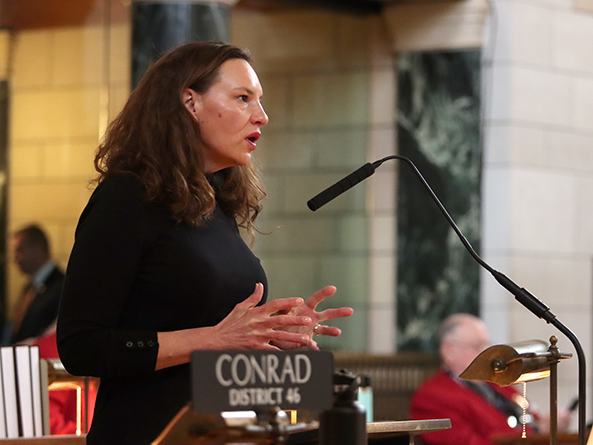Year-round daylight saving time effort fails to advance
A bill intended to spare Nebraskans from changing their clocks twice a year failed to advance from general file Feb. 5.

Under LB143, sponsored by Lincoln Sen. Danielle Conrad, Nebraska would adopt permanent daylight saving time. The switch would take effect contingent on a change in federal law or policy allowing states to do so and would require adoption of the same policy by three adjacent states.
States currently are allowed under federal law to permanently adopt year-round standard time — as Arizona and Hawaii have done — but Congress would have to act to authorize states to change to year-round daylight saving time.
Colorado and Wyoming have adopted similar “trigger laws,” Conrad said, so one additional neighboring state would need to follow suit, in addition to congressional action, before LB143 could take effect. To date, 19 states have adopted similar policies, she said.
Conrad said surveys indicate that more than 60% of Americans want to see a change in the current system, which she said negatively impacts health and safety and causes “a lot of consternation” for parents.
“Once I had little ones, that time-change management became a lot more challenging,” Conrad said. “You work so hard to get those little ones on a good schedule … and when it comes to managing your family’s daily rhythm, these two [time changes] really wreak havoc.”
Lincoln Sen. George Dungan supported the bill, citing the difficulty of accomplishing evening tasks when it is dark at 4:30 p.m.
“The U.S. Department of Energy has actually shown that permanent daylight saving time can lower energy bills by virtue of the fact that it’s lighter later and we don’t have to have our lights on as early,” Dungan said.
Sen. Steve Erdman of Bayard agreed that switching clocks back and forth is problematic. He offered an amendment that instead would adopt year-round standard time, which he said would be a better solution.
“I follow the science,” Erdman said, “and the science proves that changing to daylight saving time is detrimental to your health.”
In addition, he said, permanent standard time would not require action on the part of the federal government and would be safer for children headed to school in the winter months.
Glenvil Sen. Dave Murman supported Erdman’s amendment, saying many sleep specialists and scientists agree that daylight saving time disrupts sleep patterns and is detrimental to overall health and well-being. For example, he said, dark mornings lead to safety issues for children waiting for buses in the winter.
“Ensuring we have sunny mornings may seem like a simple convenience issue,” Murman said, “but the reality is it’s a public health issue and a public safety issue.”
Thurston Sen. Joni Albrecht opposed the amendment, citing concerns brought to her by constituents and members of the broadcasting industry. Permanent standard time would cause a variety of programming disruptions for broadcasters near the state’s borders, she said, including the many stations that rely on “feeders” in border states for news and weather information.
Conrad did not oppose Erdman’s amendment, saying her goal was to stop the switching of clocks twice a year and that she was “not married” to which approach lawmakers took to achieve that goal.
Following defeat of the Erdman amendment on a vote of 19-25, senators voted 14-25 on the advancement of LB143 to select file. Twenty-five votes were needed.


